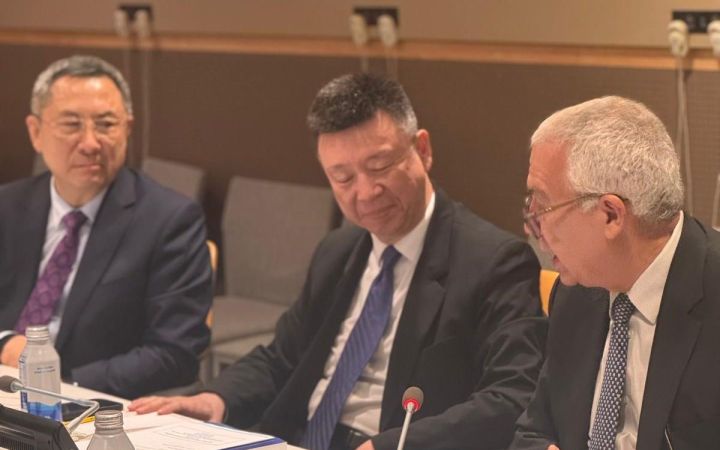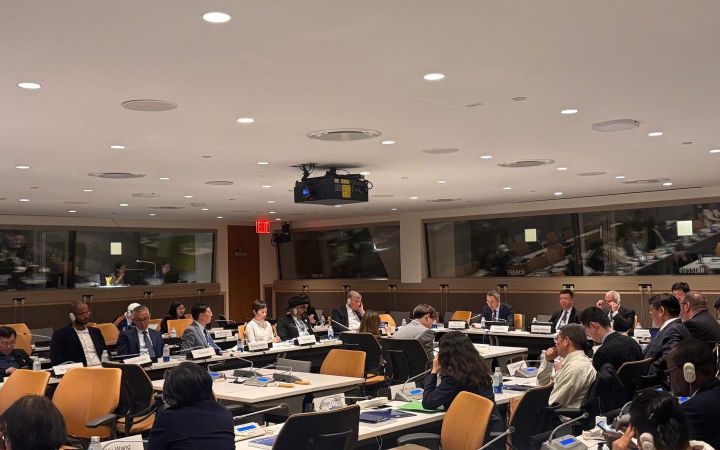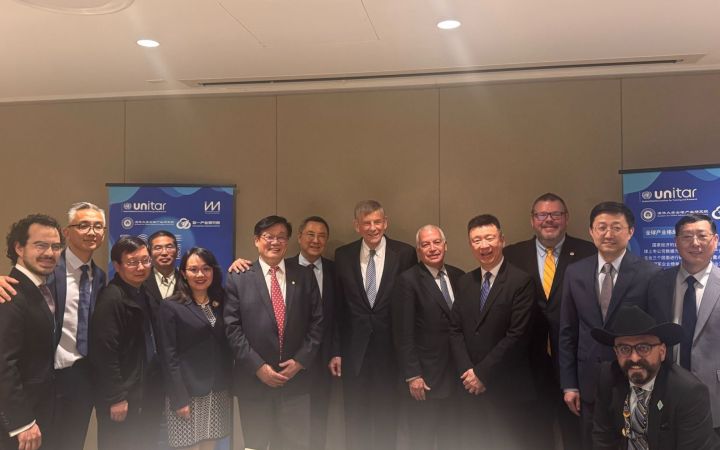5 May 2025, New York, United States — The United Nations Institute for Training and Research (UNITAR) New York Office, in collaboration with the International Academy for Arts and Cultural Studies (IAA), convened the Global Industry Joint Development Forum on Tuesday, 22 April 2025, at United Nations Headquarters in New York. Under the theme “Global Industrial Collaboration and Innovation Amidst Change”, the Forum served as an important platform for multi-stakeholder dialogue, bringing together senior officials, leading scholars, and private sector representatives to advance discourse on sustainable industrial development, innovation, and international cooperation in a rapidly evolving global environment.
The Forum underscored the critical importance of revitalizing cross-border cooperation, fostering industrial innovation, and reinforcing multilateral collaboration to achieve shared sustainable development objectives. The event welcomed more than 70 distinguished participants representing the United Nations system, leading academic institutions, and prominent global enterprises. Together, they engaged in meaningful dialogue on the opportunities and challenges facing the industrial sector, with particular focus on fostering inclusive growth, advancing sustainable economic recovery, and identifying innovative pathways to address emerging global trends.
Delivering the opening remarks, Mr. Marco Suazo, Head of the UNITAR office in New York emphasized UNITAR’s longstanding commitment to strengthening the capacity of Member States and diverse stakeholders through inclusive training and knowledge-sharing initiatives. He highlighted that the current era demands renewed and deepened collaboration across sectors and regions to build resilient, forward-looking industrial ecosystems capable of supporting sustainable and inclusive economic progress. Mr. Suazo underscored UNITAR’s role in convening strategic platforms that enable policy dialogue, promote innovation, and facilitate practical solutions to complex global challenges.
Complementing these remarks, Mr. Zeng Jinsong, Secretary-General of the Institute for Global Industry at Tsinghua University, outlined the vital role of academic institutions in advancing evidence-based policymaking, promoting cross-sector dialogue, and generating actionable insights to support the sustainable transformation of industries worldwide. He affirmed the importance of partnerships between academia, the private sector, and international organizations in shaping innovative, future-oriented industrial strategies.
The Forum featured a series of insightful keynote addresses by experts and thought leaders who shared perspectives on emerging industrial trends, economic transformations, and strategies to enhance global competitiveness. Professor Edmund S. Phelps, McVickar Professor Emeritus of Political Economy at Columbia University and recipient of the 2006 Nobel Memorial Prize in Economic Sciences, provided a comprehensive overview of long-term economic innovation and the evolving landscape of global productivity. Dr. Hermann Simon, a distinguished German scholar, reflected on best practices and competitive strategies for enterprises operating within the context of global industrial change. Professor David Sprott, Henry Y. Hwang Dean and Professor of Marketing at the Drucker School of Management, Claremont Graduate University, discussed the role of entrepreneurial leadership and academic innovation in shaping dynamic industrial ecosystems.
A central highlight of the Forum was the formal launch of the Global Industrial Competitiveness and Leading Enterprises Report, presented by Professor He Zhiyi, Principal Expert at the Institute for Global Industry at Tsinghua University, Professor at the Guanghua School of Management at Peking University, and Chairman of the Zhiyi Industrial Research Institute. Professor He provided an in-depth presentation of the report’s key findings, offering a comprehensive analysis of the evolving dynamics of global industrial competitiveness, sectoral trends, and strategic opportunities for enterprises seeking to navigate complex international markets. The report’s evidence-based insights aim to inform policymakers, industry leaders, and scholars on best practices and emerging frontiers in global industrial development.
Further enriching the Forum’s substantive content, Mr. Chen Li, Research Fellow at the Zhiyi Industrial Research Institute and Founder and Chairman of Hua Medicine, offered a detailed research presentation that explored the intersection of industrial innovation and healthcare technology. Dr. Wu Ke, Research Fellow at the Zhiyi Industrial Research Institute and Associate Professor at the Institute for Risk Analysis, Prediction and Management (Risks-X) at Southern University of Science and Technology (SUSTech), shared his expertise on risk management, industrial resilience, and technological advancement. Mr. Zhang Zhanwu, Research Fellow at the Zhiyi Industrial Research Institute and Vice Chairman of the China Society of Labor, contributed an analytical perspective on labor market transformations and the role of workforce development in supporting industrial competitiveness.
The Forum concluded with a thoughtful exchange of reflections and insights from participating experts and delegates. Discussions reaffirmed the need for sustained international dialogue, deepened cross-sector partnerships, and innovative policy approaches to strengthen the resilience, inclusivity, and sustainability of industrial systems worldwide.
The Global Industry Joint Development Forum was organized by UNITAR in collaboration with the International Academy for Arts and Cultural Studies, the Zhiyi Industrial Research Institute and Beijing Southeast Rongxin Investment Co., Ltd., with academic support from the Institute for Global Industry at Tsinghua University.
The success of the Global Industry Joint Development Forum reaffirms UNITAR’s leadership in convening impactful platforms that empower global stakeholders to exchange knowledge, strengthen partnerships, and advance innovation in support of inclusive and sustainable development.




